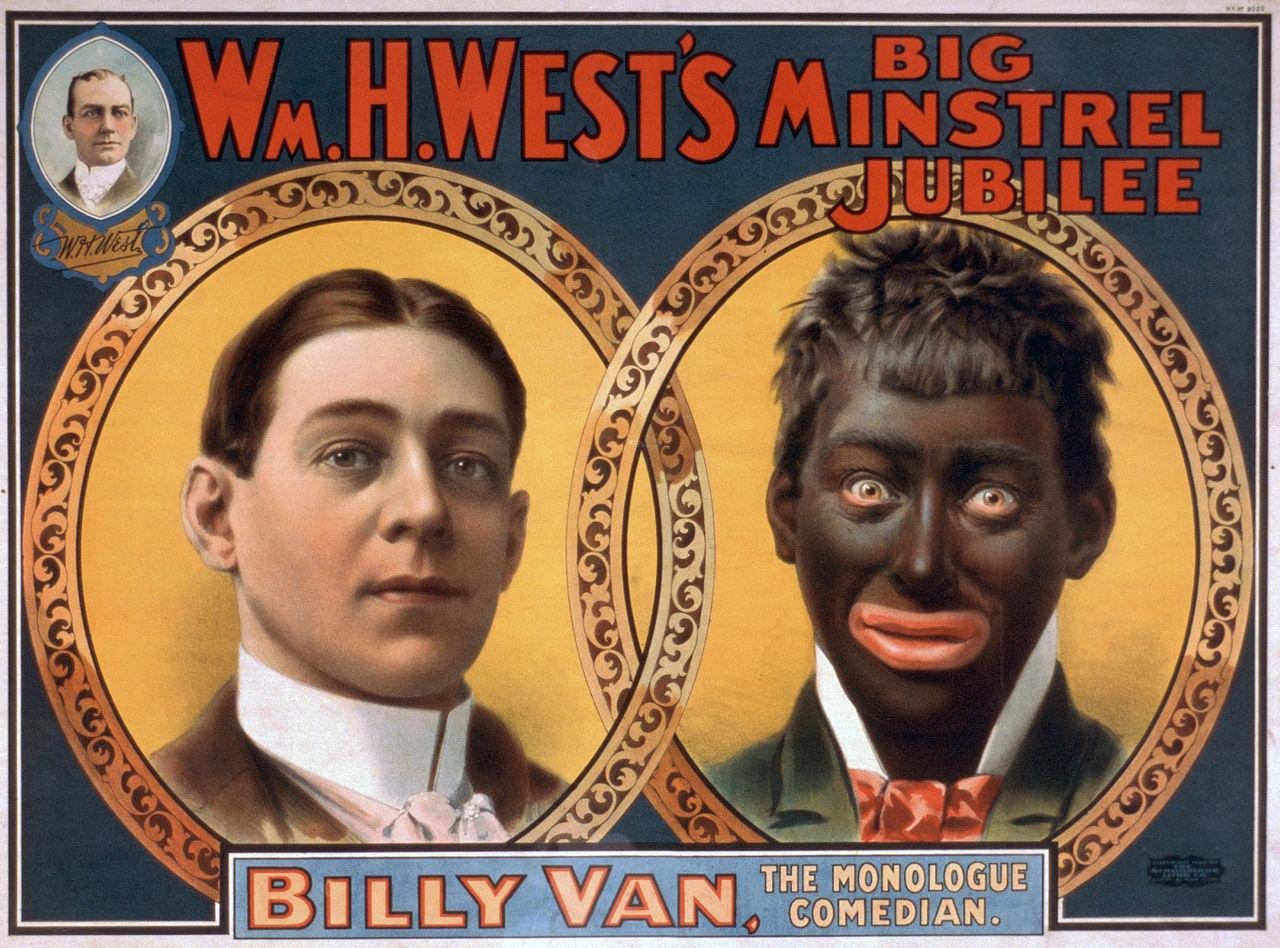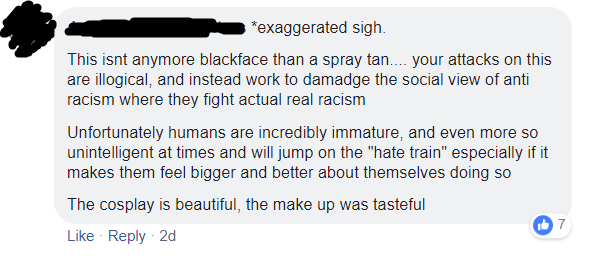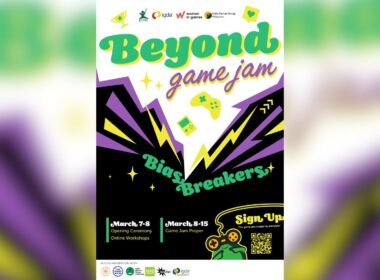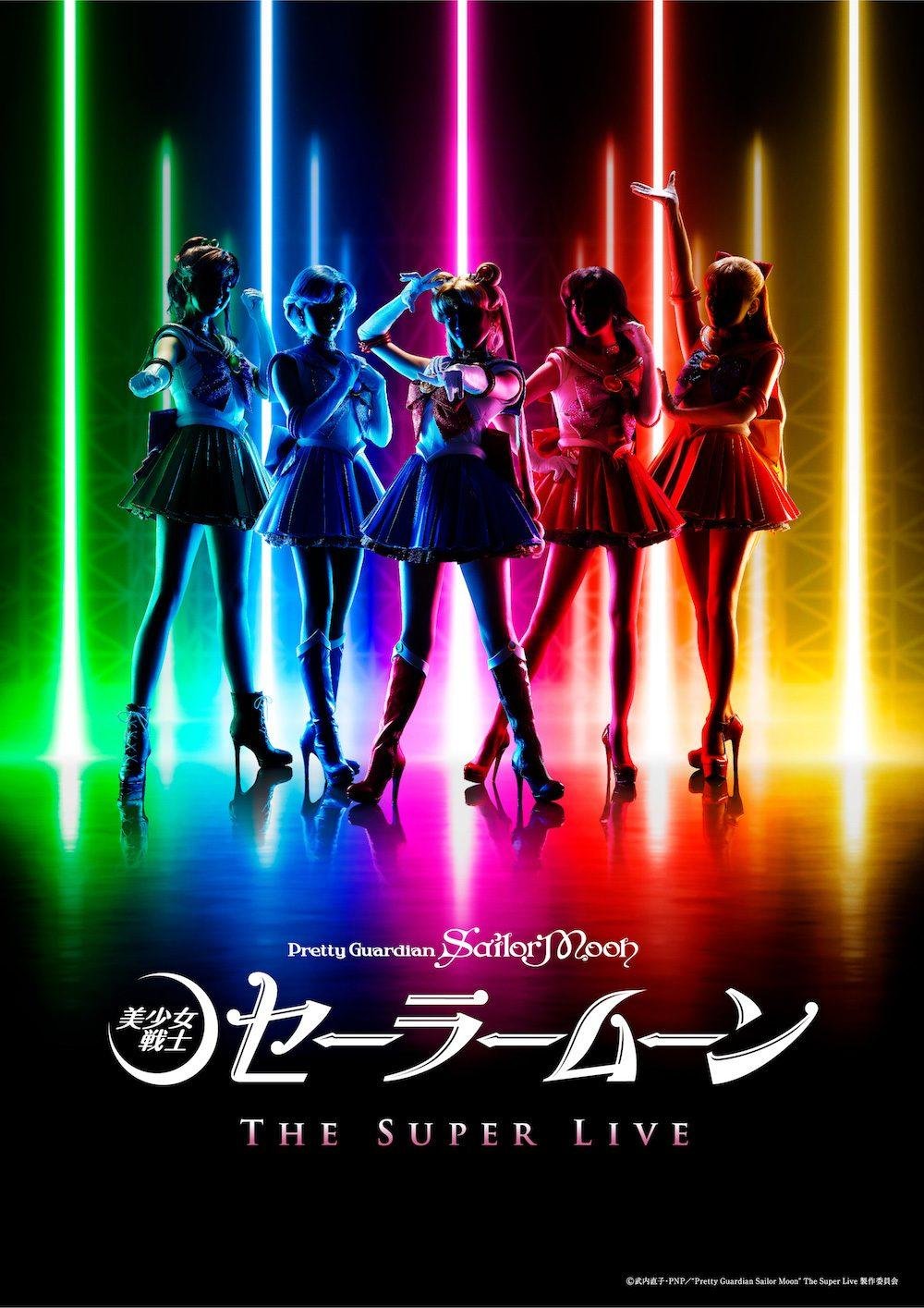Can a racist cosplay? Certainly. Can a cosplay be considered racist? Certainly. However, where do we draw the line between what is racist and what is not racist? Today, I would like to look into a specific topic that has been quite “hot” recently, and it involves black-facing/brown-facing.
The Issue
The issue at hand involves PUGOFFKA, one of the top cosplayers/photographers in Cure WorldCosplay. She recently faced backlash due to her Avatar album, specifically she faced backlash due to the Katara cosplayer who used makeup to intentionally darken her skin tone and complexion.
Many were outraged, claiming that the cosplayer is racist and that it’s wrong to engage in brown-facing. The backlash was a bit too much, and PUGOFFKA proceeded to make a post trying to defend her actions. However, that post received major backlash as well and it seems like there is nothing she can do but stand her ground at this point.

The Definition
Now, there’s a lot to unpack here and there are several layers to this whole thing as it isn’t clear cut on who is wrong and who is right. Let’s begin with the definition of racist which I believe is the core of this whole conversation. Racist is defined as “a person who shows or feels discrimination or prejudice against people of other races, or who believes that a particular race is superior to another.”
The keywords here being discrimination, prejudice and superior. So, a general rule of thumb is that if someone feels or shows that someone else’s race is inferior to their own in any way, by that definition, the person is racist.

The next thing to unpack is black-facing/brown-facing. According to Wikipedia, it is defined as “Black-face was and is a form of theatrical make-up used predominantly by non-black performers to represent a caricature of a black person.” At this point, most Malaysian readers out there may think that this isn’t such a big deal, but there is more to black-facing than just trying to represent a black person.
The black-face character in theatre was usually involved in Minstrel shows which usually displayed black people as “dim-witted, lazy, buffoonish, superstitious, and happy-go-lucky” as quoted from wikipedia. So, essentially, black-facing has connotations to a dark past when white people would make themselves look black to play a character that exhibits stereotypical negative traits, and by extension, propagate negative stereotypes about black people at that time.

*From here thereon out, the term “color-facing” will be used to refer to darkening or lightening one’s complexion and skin tone and does not include connotations relating to the term such as explicitly stereotyping the blacks to streamline the reading experience.
The Argument: Racist or Not Racist?
Not racist!
On one side of the argument, a huge portion argued that the cosplayer is not racist, or at least, she wasn’t engaging in any activity that is purposefully racist by nature, even though she used make up to darken her complexion and skin tone. The main reason for this stance is that cosplay is regarded as a form of art, while the act of making one’s skin tone darker is an extension of the expression of this art to attain the best “accurate” portrayal of the character being cosplayed.
Some go one step further to claim that those who see it as racist are the racists themselves, as the cosplay is not meant to discriminate or show prejudice towards another race, and instead it’s just to portray the character accurately. There are many who also try and flip the scenario to back their opinion, saying that they’ve whitened their complexion to cosplay characters with a lighter skin tone.



Racist!
On the other side, there are a huge portion of those who claim the cosplayer is racist since she engaged in brown-facing/black-facing, which as mentioned earlier, had connotations with discrimination in the past. While many say that the cosplayer may not bear ill will, she is nevertheless racist. They further explained that just because the cosplayer does not intend or not see it as racist does not make it any less racist.
Majority of this side of the coin believe that this action cannot be excused due to art or accuracy reasons. They further explained themselves by saying that they’ve seen many people that were able to cosplay another character of a different ethnicity without having to change their skin color, while still being recognized as the character they are cosplaying. Some brought up real-life examples of what they’ve seen. Some even used themselves as examples saying they’ve cosplayed a white character without “white-facing” or vice versa.



The Clash
After browsing through numerous comments from both sides of the argument, and listening to some of my friends’ opinions, the fine line between right and wrong is still blurred at best. Both sides stand to have legit arguments. However, I think we are all missing one big crucial point in this divide in opinion, and that is the location the person involved resides in and the culture of the mentioned place.
Why would the location and culture matter? Everything. So let’s try and envision that someone cosplayed as a 50s Imperial Japanese Army in Malaysia. For those outside Malaysia who aren’t familiar with the history of Malaysia, they will not see this as anything inherently wrong. In fact, they may see it as someone engaging in harmless historic role playing. However, for Malaysians, this may seem inappropriate to many, as the Japanese army made many Malaysians suffer back during the days when they colonised Malaysia.
In that case, Malaysians would be rightfully offended at cosplayers downplaying a dark past as some kind of fun cosplay. Adding on to that, then wouldn’t it be too much if Malaysians were offended at a foreigner cosplaying as the Japanese army? They wouldn’t know the significance of cosplaying Japanese Army to Malaysians, and why should they care, when they aren’t even cosplaying in Malaysia?

Should Malaysians then feel insulted when Japanese cosplay the Japanese Army?
Similarly, if a cosplayer in Malaysia were to engage in what everyone calls as “black-facing” for accuracy purposes without explicitly trying to offend the other person’s race, is it wrong? Most Malaysians don’t see it as offensive because “black-facing” as a concept isn’t even a thing in Malaysia. There was no historic exploitation of people of a darker skin tone. Therefore, it is pretty much a non-issue in Malaysia.
One may argue that when you post pictures of the black-facing cosplay online for the world to see, you will need to be aware and try not to offend anyone. That might be a compelling argument, but it breaks apart the moment you think about how so many people are offended by different things, that it becomes practically impossible to navigate the online space without offending somebody.
If we were to operate by that concept, wouldn’t that mean that no one would be allowed to post pictures of pigs, pork or any pig-related products because there are literally millions of Muslims out there who might feel that it is offensive? Then would I be not allowed to share LGBTQ-related articles or images just because it offends millions out there?
However, that doesn’t mean that everything is off the hook. Take misleading articles for example. If I were to write a misleading article with the intention to mislead others or spread fake information, I would be in the wrong because I’ve objectively caused harm or distress by spreading fake information or misleading others.
There was a commenter who expressed a rather interesting idea in PUGOFFKA’s post. To grossly simplify his sentiment, he expressed that people who are mad about this black-face issue could be seen as quite hypocritical when there are also people cosplaying as disabled characters such as Professor Xavier without getting criticised. In that case, most if not all of the circumstances are similar to a person engaging in black-facing. The disabled are often bullied or discriminated against in the past and even now. Disabled people are often born with those traits and they cannot change the fact that they are disabled. To make matters worse, disabled people by definition have a harder time navigating the modern world.

Moving on, many of my friends expressed their opinion about how changing one’s skin tone for the purpose of cosplay accuracy is not required and it felt like borderline obsession with perfection. Many would say that cosplay is not meant to be a 1 to 1 recreation of the character and it has more to do with the costume design, and the role-playing aspect of the character to successfully bring the character to life. I understand that sentiment, and I think I also follow this line of logic, but that doesn’t mean people aren’t allowed to take the extra step to ensure they look even closer to the character they love.
In fact, there are instances where cosplayers are attacked for not being white or dark enough. The conundrum is definitely there; alter your skin tone or not, you’ll still get attacked. So, wouldn’t the middle ground be to just let everyone do what they want and never judge a cosplay based on skin tone?
Didn’t change your skin tone? Doesn’t matter, your cosplay is still awesome!
Changed your skin tone? Wow, you took the extra step, good on you!
Ultimately, I think one of my friends said it best. To paraphrase him, when we get angry and offended by these things, we are literally giving power to these racist connotation, thereby perpetuating racist tendencies. He said another statement which I think is very true and is the key to solving this problem, “If you constantly dwell on the actions of the past, their sacrifices and suffering would literally have been in vain. So instead of the scars of racism healing, they remain eternal.”
There is no clear right or wrong here. Many are rightfully offended due to the heavily loaded implications behind darkening ones skin tone. However, another one of my friends said this “You have to be aware that it’s not just about you.” He said this when referring to how people should be more aware of the implication behind darkening ones skin tone.
That quote should work both ways as well: Those who are offended should try to see beyond what they understand and step into the other person’s shoes alongside its context. At the same time, cosplayers should try to be a little more sensitive, especially the ones with American audiences, where the issue of color-facing is most prominent.
Conclusion
As usual, context really matters and it changes everything. In the context of cosplays everywhere besides America, black-facing could be considered a non-issue as there are fewer historical implications or connotations behind the action of darkening one’s skin tone. On the other hand, black-facing is a huge issue in America, and it is heavily loaded with lots of negative history and connotations. When both of these cultures clash, one should keep in mind the difference in culture. In the case of PUGOFFKA, the Americans shouldn’t criticise what PUGOFFKA did based on American culture and should keep in mind that she is based in Ukraine.
Let’s all try to get along, and try to be more understanding while finding the middle ground. Hopefully that mutual understanding and peace can be achieved sooner than later.











